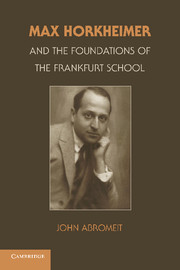Book contents
- Frontmatter
- Contents
- Acknowledgments
- A Note on References and Permissions
- Introduction
- 1 Coming of Age in Wilhelmine Germany
- 2 Student Years in Frankfurt
- 3 A Materialist Interpretation of the History of Modern Philosophy
- 4 The Beginnings of a Critical Theory of Contemporary Society
- 5 Horkheimer’s Integration of Psychoanalysis into His Theory of Contemporary Society
- 6 Horkheimer’s Concept of Materialism in the Early 1930s
- 7 The Anthropology of the Bourgeois Epoch
- 8 Reflections on Dialectical Logic in the Mid-1930s
- Excursus I The Theoretical Foundations of Horkheimer’s Split with Erich Fromm in the Late 1930s
- Excursus II Divergence, Estrangement, and Gradual Rapprochement
- 9 State Capitalism – The End of Horkheimer’s Early Critical Theory
- Epilogue
- Selected Bibliography
- Index
- References
1 - Coming of Age in Wilhelmine Germany
Published online by Cambridge University Press: 05 June 2012
- Frontmatter
- Contents
- Acknowledgments
- A Note on References and Permissions
- Introduction
- 1 Coming of Age in Wilhelmine Germany
- 2 Student Years in Frankfurt
- 3 A Materialist Interpretation of the History of Modern Philosophy
- 4 The Beginnings of a Critical Theory of Contemporary Society
- 5 Horkheimer’s Integration of Psychoanalysis into His Theory of Contemporary Society
- 6 Horkheimer’s Concept of Materialism in the Early 1930s
- 7 The Anthropology of the Bourgeois Epoch
- 8 Reflections on Dialectical Logic in the Mid-1930s
- Excursus I The Theoretical Foundations of Horkheimer’s Split with Erich Fromm in the Late 1930s
- Excursus II Divergence, Estrangement, and Gradual Rapprochement
- 9 State Capitalism – The End of Horkheimer’s Early Critical Theory
- Epilogue
- Selected Bibliography
- Index
- References
Summary
There is nothing a philistine hates more than the dreams of his youth.
Walter BenjaminChildhood and youth
Max Horkheimer was born on February 14, 1895, in Zuffenhausen, a small town on the outskirts of Stuttgart, in southern Germany. Horkheimer’s parents were part of Stuttgart’s Jewish community that had grown steadily in the course of the nineteenth century and had succeeded in establishing itself as an integral part of the city’s economic, political, and cultural life. When King Charles of Württemberg approved the passage of a law in 1864 that guaranteed equal citizenship for Stuttgart’s Jews, the road was opened for fifty years of prosperity and relatively harmonious coexistence. Horkheimer’s father, Moritz, who was born in neighboring Baden in 1858, was able to take advantage of the economic opportunities available in Stuttgart during this period of rapid industrialization in Germany as a whole. Although Moritz Horkheimer’s father had been an unsuccessful businessman from whom he had inherited substantial debts, he was able steadily to work his way up in the Stuttgart textile industry. By the beginning of World War I, Moritz Horkheimer had firmly established himself among the ranks of the city’s millionaires, an elite that numbered no more than 250 at the time. In 1892, however, when Moritz Horkheimer married Babette Lauchheimer, he was still far from being an established figure. Lauchheimer’s parents, who were very well-to-do and of strict orthodox faith, agreed to the marriage with considerable reluctance. Only gradually, with his mounting business success, was Moritz Horkheimer able to overcome the suspicion and condescension of his in-laws.
Moritz Horkheimer thus came to embody the promise of the liberal capitalism that was transforming the economy, if not the political institutions, of Imperial Germany in the last decades of the nineteenth century. He attributed his success in large part to the country and the region that he believed had made it possible. He was a patriotic citizen of Germany and proud of his regional affiliation with Stuttgart and the greater region of Württemberg as well. When the Second International met in Stuttgart in 1907, Max Horkheimer recalls his father castigating the Social Democrats in general and “bloody” Rosa Luxemburg in particular for their lack of loyalty to the fatherland. Moritz Horkheimer joined in the wave of enthusiasm that swept through Germany with the beginning of World War I. In the following years, he placed his factory in the service of the war effort, producing badly needed textiles. His devotion did not go unrecognized either. In 1916, he was awarded the Charlottenkreuz and the Ritterkreuz I. Klasse by the king of Württemberg. In 1917, he was given the honorary title of Kommerzienrat, once again by the king of Württemberg. In 1918, he was made a citizen of honor of Zuffenhausen; he was the last Jew in the Stuttgart area to receive the title. Moritz Horkheimer’s patriotism was so ardent that he refused to leave Germany until 1939. He defended his choice to stay in Germany by saying that his family had been living there longer than Adolf Hitler.
- Type
- Chapter
- Information
- Publisher: Cambridge University PressPrint publication year: 2011



